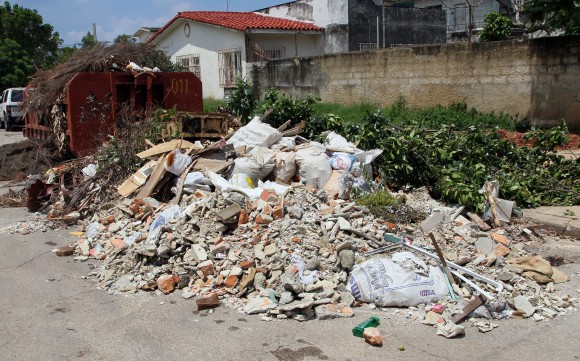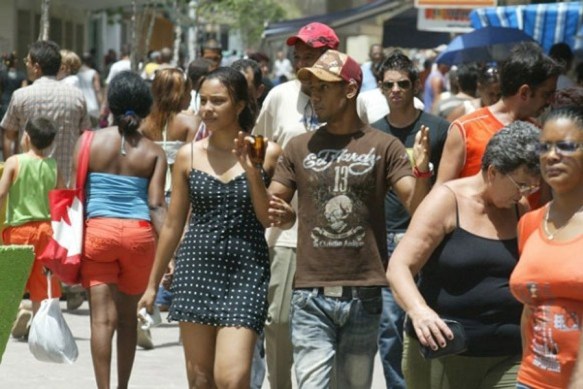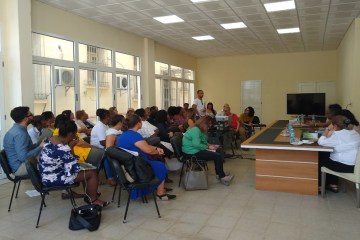Translations 677
A Smartphone App called Duolingo

A Smartphone App called Duolingo
Do you like to learn another language? One of the most enjoyable ways is with Duolingo, an application available for iOS and Android, as well as in web format, which allows users to get into the basics of multiple languages
By Yurisander Guevara
February 26, 2020
Translated and edited by Walter Lippmann for CubaNews.
 Do you like to learn another language? One of the most enjoyable ways is with Duolingo, an application available for iOS and Android, as well as in web format, which allows users to get into the basics of multiple languages.
Do you like to learn another language? One of the most enjoyable ways is with Duolingo, an application available for iOS and Android, as well as in web format, which allows users to get into the basics of multiple languages.
Its creators designed the application in a very visual way. “Our short, free lessons are designed to feel more like a game than a study book. Learning is easier when you’re having fun,” they say.
The lessons focus on a real-world goal, such as ordering in a restaurant. Students develop the vocabulary and grammar necessary to achieve that goal through varied reading, writing, listening and speaking practice.
According to its creators, the application has over 300 million users.
New Water Rates Announced

New Water Rates Announced
The new prices should contribute to the saving of the vital liquid in hotel facilities, industries and other centers of the production and services
February 28, 2020
Translated and edited by Walter Lippmann for CubaNews.
New water charges for hydrometric control in the productive or service sector will begin to be applied as of April 1, officials from the Higher Organization of Business Management (OSDE) Water and Sanitation, of the National Institute of Hydraulic Resources, reported in Havana.
According to the Cuban News Agency, the new prices should contribute to saving the vital liquid in hotels, industries and other centers of production and services, many of which have become large consumers, said Marcia Almeida Llanes, director of State Commissioning of the aforementioned OSDE.
She clarified that, in addition to the companies in this group, there are also self-employed workers and cooperatives, especially when some of their activities or businesses require the important natural resource for commercial purposes.
Likewise, she explained that the water supply service will maintain up to the established standard of a cost of 1.55 pesos per cubic meter (m3) for hotels and other tourism entities.
Industries or other productive sectors and commercial facilities of service and offices will have as rates an amount of 4.20 pesos/m3 until its established standard and an increase to 15 pesos/m3 if they exceed 25 percent of the same. However, there are also discount bonuses of up to 35 percent for entities that save below 25 percent of the established standard, said Almeida Llanes.
New Spawn of Useless Psychological Warfare

Measure 191: New Spawn of Useless Psychological Warfare
Granma offers details of other ways to send remittances
By Raúl Antonio Capote | internacionales@granma.cu
February 28, 2020
Translated and edited by Walter Lippmann for CubaNews.
Trump’s most recent action against the Cuban family, starting with the cancellation of remittances sent through Western Union from countries other than the United States, confirms an old modus operandi typical of psychological warfare designed in the company’s manuals.
The logic behind the method is described in agency documents that were declassified in the late 1990s. They explain that the proper way to break resistance is to create a violent rift between people and their ability to explain themselves and understand the world around them. The constant blows that affect the normal rhythm of life, that affect the daily life of individuals, can create serious psychological disorders.
As with other decisions taken previously against the people of Cuba, in order to incite discouragement, the measure 191 that the U.S. Government “imposes” on the Caribbean nation is part of the set of techniques outlined to provoke a state of shock.
The constant “rain” of measures, almost all of them announced on Thursdays or Fridays, is intended to directly affect such important things as transportation, cooking fuel, and electricity generation, and to place the citizenry in a state of deep disorientation and unrest, of depression and anguish.
The aim is to cause people to fall into a state of regression and fear, to be unable to think rationally, which, according to the CIA, would limit resistance to zero and make them act against themselves.
More than the economic damage that this strategy may cause, the aim is to create a psychological state of defeat, which, together with other covert actions, may generate chaos and ungovernability.
It is not only Western Union that operates in sending money. The American company shares the market with other competitors in the rest of the world.
Money can be sent to Cuba through bank transfers, bank to bank, through travel agencies or using electronic cards, for example, the American International Service (AIS).
Magnetic cards for purchases in freely convertible currency allow deposits that can be made by bank transfers from abroad, through correspondent banks. In addition, Fincimex has commercial relations with more than ten international companies for sending money.
New Water Rates Announced

New Water Rates Announced
The new prices should contribute to the saving of vital liquid in hotel facilities, industries and other centers of production and services
Published: Friday 28 February 2020 | 12:33:22 am.
By Juventud Rebelde
Translated and edited by Walter Lippmann for CubaNews.
New water charges for hydrometric control in the productive or service sector will start to be applied from April 1, informed in Havana executives of the Higher Organization of Business Management (OSDE) Water and Sanitation, of the National Institute of Hydraulic Resources.
According to the Cuban News Agency, the new prices should contribute to saving the vital liquid in hotels, industries and other centers of production and services, many of which have become large consumers, said Marcia Almeida Llanes, director of State Commissioning of the aforementioned OSDE.
She clarified that, in addition to the companies in this group, there are also self-employed workers and cooperatives, especially when some of their activities or businesses require the important natural resource for commercial purposes.
Likewise, she explained that the water supply service will maintain up to the established standard of a cost of 1.55 pesos per cubic meter (m3) for hotels and other tourism entities.
The industries or other productive sectors and commercial facilities of service and offices will have as rates an amount of 4.20 pesos/m3 until its established standard and an increase to 15 pesos/m3 if they exceed 25 percent of the same. However, there are also discount bonuses of up to 35 percent for entities that save below 25 percent of the established standard, said Almeida Llanes.
Fines Up to 3,000 Pesos for Littering

Since March in Havana, Fines of Up to 3,000 pesos for Throwing Debris Outside Established Sites
February 20, 2020
Translated and edited by Walter Lippmann for CubaNews.

As of March, those who generate cadres like this in the Cuban capital will have to think about it and comply with the regulations of the local authorities. Photo: Ismael Francisco/Cubadebate
The provincial government of Havana, as part of the People’s Movement for a More Beautiful, Cleaner and Healthier Havana, has established that the state entities or families that carry out constructive actions in their properties are responsible for the final destination of the rubble generated. It must be deposited only in the sites defined for that purpose by the people’s councils.
As of March 1, this provision, in accordance with the City’s Ornamental Regulations, also establishes that the rubble may be deposited at the points defined by each people’s council, which will never coincide with the traditional points for depositing domestic waste.
In the case of residents in the municipalities of Central Havana and Old Havana, citizens and entities may contract the debris collection service to the Water Company of Havana.
In the remaining municipalities, this can be done by contacting the Provincial Direction of Hygiene, through the telephone numbers 7260-1440, Command Post, and 7260-3011, Commercial Department.
Violation of the rules may be subject to a fine of up to 3,000 pesos.
It is also established that each state or social entity is responsible for the permanent cleaning and beautification of its establishments, including its perimeter environment.
The structures of each people’s council, in close coordination and with the active participation of the CDR, FMC, CTC, ANAP and the Association of Combatants, will systematically develop mobilization actions aimed at maintaining cleanliness in the community, calling on families to deposit household waste at established collection points and during the hours of 6:00 p.m. to 10:00 p.m.
Those who violate this communal hygiene norm could be fined up to 1,500 pesos. Similarly, the person responsible for collecting the waste may be fined similarly if he or she fails to comply with it.
Cuban Guide Addresses Sexual Dysfunctions
IPS in Cuba
Cuba Has a Guide to Address Sexual Dysfunctions
It was one of the results shared at the 5th Scientific and Methodological Conference of the state-run National Center for Sex Education.
February 22, 2020
Translated and edited by Walter Lippmann for CubaNews.

At the conference, it was revealed that guidelines are available to care for those suffering from sexual dysfunctions and disorders in Cuba.
Photo: Jorge Luis Baños/ IPS
Havana, 22 February – What should a doctor tell and guide a man with erectile dysfunction or a woman with an orgasmic disorder? Until very recently, there were no practical guidelines in Cuba for dealing with this health problem.
Today there are guidelines for attending to those suffering from male and female sexual dysfunctions and disorders thanks to a research project carried out by the state-run National Center for Sex Education (Cenesex), explained physician Elvia de Dios Blanco.
From 2016 to 2018, a team of 12 specialists worked on the systematization of the theoretical-methodological references that support care for sexual dysfunctions and disorders in the world and in Cuba, as well as the preparation and evaluation of the guidelines, De Dios said at the 5th Scientific-Methodological Conference of Cenesex.
In the first stage, she said, guidelines were designed for disorders of hypoactive male and female sexual desire, female orgasmic disorder, premature ejaculation and erectile dysfunction, which are the most frequent requests for attention.
In the second phase, guidelines were drawn up for female sexual arousal disorders, pain disorders and vaginismus, as well as paraphilic disorders, he said at the meeting, held Feb. 20, where the institution’s scientific results were presented.
“The ones the one on erectile dysfunction, hypoactive disorder and female orgasmic disorderare published in the Cenesex magazine Sexología y Sociedad. For those pending publication, we coordinated with the Ministry of Public Health to train facilitators for each of Havana’s 15 municipalities, and then extend them to other territories,” she said.

Moments from the day-long scientific conference.
Photo: IPS Cuba Archive
In her opinion, medical professionals are better prepared for male sexual dysfunctions than for female ones, “because really women come very little, they have their problems and they stay with them and don’t come. That happens worldwide, not just in Cuba.
In the expert’s opinion, the Cuban guidelines differ “from the rest of the models that exist internationally in that they include sexual education in all sexual dysfunctions and specify the functions of the integral general physician as a gateway to the health system.
Doctors “must explain to people who seek care the human sexual response, its modifications in the different stages of life, with chronic diseases and with drugs,” he said.
At the same time, she said, sex education should include the presentation of masturbation as a healthy form of sexual activity and the need for privacy in sexual relations.
Education, she insisted, involves making a 20-year-old diabetic man understand that if he doesn’t take his medication, when he is 40 he can develop atherosclerosis, because his fat metabolism is affected, his vessels become hard and blood doesn’t enter his penis.
New paradigms
The conference unfolded a full-day program, where other results and developments were presented.
The Cuban legislative schedule foresees the presentation to the National Assembly of People’s Power (unicameral parliament) of an amendment to the Public Health Law (Law 41 of 1983) by the end of 2020, with a view to moving away from the biomedical paradigm and towards a rights-based approach.
Jurist Ivón Calaña, head of the Legal Advisory and International Relations Department of CENESEX, explained that several groups of specialists are working on different proposals. One concern is that this law must be approved before the new Family Code (planned for 2021), which would leave out some issues, including the autonomy of adolescents in matters of sexuality.
One of the aspects that the health law would include is to clearly specify abortion as a right of women to voluntarily interrupt pregnancy, a procedure that has been available safely and free of charge for more than 50 years in the country.
If the current law referred to quality of health in terms of building care centers, developing the pharmaceutical industry and training personnel, the proposal takes a qualitative leap forward by privileging primary health care as the first level of care for individuals, families and the community in a comprehensive manner.
“From this change, the patient is seen as a subject of rights and duties, because there will be a legal relationship, typical of a service provision, like any other,” he said.
One of the areas analyzed is gender-based violence, which would allow the subsequent implementation of protocols for the care of victims, mainly women and children, she said.
The proposals introduce health concepts that have been absent until now, such as autonomy, integrity, informed consent, privacy, anatomical sex change, the right to decide on the body and obstetric violence, and the right to decide on the number and spacing of children, not only for infertile couples – as is the case in the proposed text – but for all couples.
The long-awaited code
The main advances in the area of sexual rights contained in the proposal of what would be the new Family Code were presented by Manuel Vázquez, deputy director of CENESEX, who is participating in the temporary group working on the text and has had as a good practice to conduct academic debates.
“That a Family Code is proposed, but rather than a name, it is a constitutional mandate in terms of plurality to recognize and protect all families, in all their diversity, regardless of the ways in which they are structured,” he stressed.
Among other aspects, the bill proposes the elimination of the exceptionality to contract marriage before the age of 18, the recognition of marriage and de facto union, the economic regime of marriage, the change of the term parental authority to parental responsibility, the procreational will and multi- and pluri-parenthood. (2020)
Bolivian Golpistas Want Lithium Privatization

MAS Presidential Candidate Denounces Lithium Privatization as a Target for Coup in Bolivia
Former Bolivian economy minister and presidential candidate for the Movement towards Socialism, Luis Arce, denounced on Wednesday that the privatization of lithium is one of the objectives pursued by those who perpetrated last year’s coup d’état.
—————————————————————————-
Author: Redacción Digital | internet@granma.cu
February 26, 2020 14:02:29
Translated and edited by Walter Lippmann for CubaNews.

Luis Arce, denounced that the privatization of lithium is one of the objectives pursued by those who perpetrated the coup d’état:
Former Bolivian economy minister and presidential candidate for the Movement towards Socialism, Luis Arce, denounced on Wednesday that the privatization of lithium is one of the objectives pursued by those who perpetrated the coup d’état last year.
In his Twitter account, Arce stated that “(…) the coup d’état was not against the Indian but because of lithium. It was designed by transnationals interested in its privatization along with gas (…)”.
This denunciation, which reiterates those made previously by former president Evo Morales, comes in response to the call for transnationals to invest in Bolivian lithium.
Lithium is considered the energy of the future, because of its properties and use in the manufacture of batteries for electronic effects.
Bolivia has 70 percent of the world’s proven reserves of this mineral (around 21 million metric tons), most of which are in the Uyuni salt flats, in Potosí.
During the Morales government, lithium production began to be industrialised, with the aim of generating 4.5 billion dollars a year for the country’s development.
Bread, Salt, and Everything Else

Bread, Salt, and Everything Else
 Published: Thursday 27 February 2020 | 11:48:01 pm. Updated: Friday 28 February 2020 | 12:16:12 am.
Published: Thursday 27 February 2020 | 11:48:01 pm. Updated: Friday 28 February 2020 | 12:16:12 am.
By Yoerky Sánchez Cuéllar
Translated and edited by Walter Lippmann for CubaNews.
The pressure valve resonates and they keep adding fuel to the fire. Let the pot explode. This is what the American circles of power want every time they announce a perverse measure against this small archipelago which, at the cost of sacrifice and resistance, pays the price of being independent.
My generation was born under the effects of the blockade. Perhaps at that time its economic impact was not so visible, thanks to the mutually advantageous relations and agreements established with the socialist camp. Until I was seven years old I fully enjoyed my childhood, playing bowling or watching dolls and adventures in an old Krim 218 at the house of my friends in the neighbourhood. But then the 1990s came and the scene took a traumatic turn.
The fall of Soviet socialism cracked our economy and left it without 80 percent of its foreign trade. Transportation collapsed, factories were shut down, “gossip” lamps replaced incandescent bulbs during long hours of scheduled blackouts.
In the face of the irresistible heat, people slept on the rooftops, with their mattresses uncovered. Publications disappeared. Juventud Rebelde, for example, changed its daily frequency to a weekly newspaper. Faced with a shortage of soap, I remember my mother washing with maguey fibres. Chinese bicycles became fashionable… At that age I couldn’t really understand what was going on around me.
In the book No hay que llorar (Let’s not cry), Santa Clara writer Aristides Vega Chapú compiled testimonies from 34 Cuban authors about this period. About the difficulties of that time and how we overcame the onslaught, each Cuban can tell his own story of ingenuity and resistance. The work would be a book of many volumes.
During all this time, what was the “help” of the American rulers? Was their intention to extend their hand so that the people would overcome the crisis?
In July 1991, months before the “de-escalation,” the U.S. Senate passed several amendments imposing a number of conditions on the Soviet Union to be eligible for U.S. foreign aid. These requirements included the cessation of military and economic assistance to Cuba.
And in 1992 the US government, led by Bush senior, signed the Torricelli Act, after the Democratic candidate, William Clinton, publicly endorsed it as a result of an agreement with Jorge Más Canosa, president of the Cuban American National Foundation. The objective: to asphyxiate us economically in order to provoke social chaos and, consequently, to overthrow the political order established on the island. Illusioned by a supposed domino effect, they openly proclaimed “the end of history” for the “Castro regime”.
In that same year, the Office of Foreign Assets Control (OFAC) prohibited third-country nationals from introducing tobacco and rum from Cuba into the United States, even when these were for personal consumption. They had not yet approved the unfortunate Helms-Burton Act of 1996.
In their speech on humanitarian aid to the Cuban people, they always put one condition in advance: “If Cuba holds totally free and fair elections under international supervision, respects human rights and stops subverting its neighbors, we can hope that relations between our two countries will improve significantly,” are the words of the Assistant Secretary of State for Inter-American Affairs, in March 1990.
Thirty years later, the goals remain the same. We are asked to make political concessions as a condition for taking the pressure off the pot. In the face of Cuba’s dignified and unchanging stance, they resort to arrogance and overkill. These incluse the 85 aggressive measures of various kinds that they applied only in 2019 and which have been rejected by our people and by many in the world, who also suffer the consequences of imperial arrogance.
The writer Eduardo Galeano illustrated this act of genocide with an emphatic and sentimental style: “The blockade against Cuba has multiplied over the years. A bilateral affair? So they say; but nobody ignores that the US blockade implies, today, the universal blockade. Cuba is denied bread and salt and everything else. And it also implies, although many people ignore it, the denial of the right to self-determination. The asphyxiating siege around Cuba is a form of intervention, the most ferocious, the most effective, in its internal affairs.
In the face of this policy of permanent aggression, made worse by the Trump administration and his perverse advisors, aim9ing to make the pot explode, the best response from every Cuban is to do things right. And that the result of daily work neutralizes every plan that the enemy cooks up. In short, “emancipate ourselves by ourselves and with our own efforts,” as Fidel explained it to us in his concept of Revolution.
Sanders recognizes Cuba’s contributions

Bernie Sanders recognizes Cuba’s
contributions in education and health
U.S. Senator Bernie Sanders recognized Cuba’s role in sending doctors around the world, as well as progress in education
————————————————————————————————
Author: Web Editor | internet@granma.cu
February 25, 2020 09:02:35
Translated and edited by Walter Lippmann for CubaNews.

Bernie Sanders: Photo: Prensa Latina
U.S. Senator Bernie Sanders, now one of the strongest Democratic Party candidates for the November presidential election, recognized Cuba’s role in sending doctors around the world.
“It would be a mistake not to declare in Cuba that they have made some good progress in health care,” the 78-year-old politician admitted in an interview with CBS’ 60 Minutes program broadcast Sunday.
“They are sending doctors all over the world. They’ve made some progress in education,” said the Vermont senator who is running against Republican Donald Trump for the Nov. 3 presidential election.
As it turns out, presenter Anderson Cooper asked the current Blue Force nominee to explain his comments in 1985, when he praised some of the social programs implemented by the historic leader of the Cuban Revolution, Fidel Castro.
According to a video clip from more than 30 years ago, the senator said at the time that Fidel Castro “educated the children, gave them medical care, totally transformed society.
Although he made it clear that his “socialism” is not that of Venezuela or Cuba and stressed that the kind of society he believes in is the kind that exists for him in countries like Denmark, Finland and Sweden, the legislator said it is “unfair to simply say that everything is wrong” on the island.
“When Fidel Castro took office, do you know what he did? He had a massive literacy program,” Sanders emphasized, referring to the cultural revolution that in just one year (in 1961) made it possible to eradicate illiteracy and provide universal access to the various levels of education free of charge in the Caribbean country.
On October 17, 1962, during the inauguration of the Victoria de Girón Institute of Basic and Pre-clinical Sciences in the Cuban capital, Fidel Castro announced the government’s decision to provide aid in the field of health and said that 50 doctors would be sent to Algeria.
“Today we can only send 50, but in eight or 10 years, who knows how many, and we will be helping our brothers,” the Cuban leader warned at the time.
Almost six decades later, more than 400,000 health workers from the Greater Antilles have carried out missions in some 164 countries, while with the same disinterest 35,613 health professionals from 138 nations have been trained on the island free of charge.
As expected, his comments provoked the anger of the most extremist sector of Cuban Americans in South Florida, who oppose any rapprochement with the Caribbean island.
In 2016, Sanders defended diplomatic relations with Cuba, which he said “will result in significant improvements in the lives of Cubans and help the United States.’
In addition, he has reiterated his position regarding the elimination of the blockade that both Republican and Democratic administrations have maintained for nearly six decades.
But watch out, warn observers, his praise must be viewed with caution, despite the fact that it differs from Trump.
By the way, during the televised program, Sanders, who describes himself as a democratic socialist, promised that if he becomes president he hopes to use the “federal government to protect the interests of working families.”
In that sense, he stated that in the United States the government works for the very wealthy and although without mentioning his name he said that the president of the United States is a pathological liar.
In early February, in his State of the Union address, the occupant of the Oval Office attacked Medicare for All, one of Sanders’ main proposals.
For the Republican, this health plan seeks to destroy American health care.
Recent polls show that Sanders continues to be unstoppable, winning comfortably in Nevada’s Democratic caucuses on Saturday, and increasing his support among Latino voters, second only to former Vice President Joseph Biden.
Source: Prensa Latina
CIMEX Releases Used Car Prices

Cimex discloses prices of used cars to be sold at MLC
On Tuesday, February 25, the sale of used cars in freely convertible currency (MLC) will begin, maintaining the same payment mechanisms and currencies approved for purchases in MLC, published the Cimex Corporation on its website
Author: Yisell Rodríguez Milán | yisell@granma.cu
February 21, 2020 12:02:32
Translated and edited by Walter Lippmann for CubaNews.

On Tuesday, February 25, the sale of used cars in freely convertible currency (MLC) will begin, maintaining the same payment mechanisms and currencies approved for the purchase modality in MLC, published the Cimex Corporation on its website.
It is possible to acquire vehicles through this payment method, in a personal way, through the Car Agency located on 20th Street between 1st and 3rd, in the municipality of Playa, in the city of Havana. This establishment constitutes the only shop enabled Cuba for this service.
FROM THE SALE OF CARS IN CUBA?
PRICE, WITH A 10% DISCOUNT

Subscribe to Blog via Email
| M | T | W | T | F | S | S |
|---|---|---|---|---|---|---|
| 1 | ||||||
| 2 | 3 | 4 | 5 | 6 | 7 | 8 |
| 9 | 10 | 11 | 12 | 13 | 14 | 15 |
| 16 | 17 | 18 | 19 | 20 | 21 | 22 |
| 23 | 24 | 25 | 26 | 27 | 28 | |



You must be logged in to post a comment.